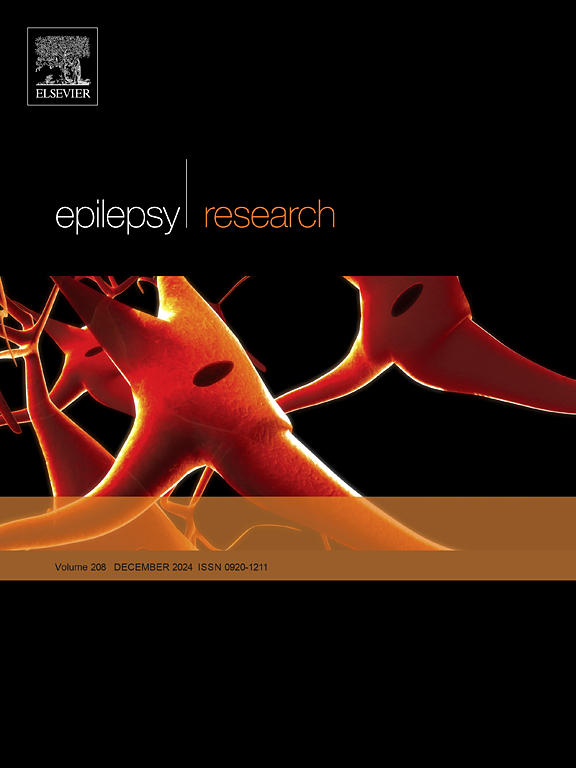癫痫样放电是局灶性癫痫记忆障碍最重要的混杂因素
IF 2
4区 医学
Q3 CLINICAL NEUROLOGY
引用次数: 0
摘要
背景:认知障碍在局灶性癫痫中非常普遍,通常归因于多因素原因,尽管各种预测因素的具体贡献仍然知之甚少。本研究旨在确定并优先考虑导致颞叶癫痫记忆缺陷的因素,特别强调间歇癫痫样放电(IED)。方法采用侵入性卵圆孔电极对48例颞叶癫痫患者进行术前评估,我们检测了离线记忆表现,并将语言和注意力作为对照。认知表现与24 h以上记录的中颞叶IED发生率以及其他因素相关,包括癫痫发作特征、发病年龄、癫痫持续时间、颞叶病变和抗癫痫药物使用。结果中颞叶IED发生率与海马依赖性认知评分呈显著负相关(r = -0.43 - - 0.29,p <; 0.05),表明IED对记忆巩固过程有直接影响。癫痫持续时间、抗癫痫药物使用和全面性癫痫发作显示出有限的关联,但包括癫痫发作频率在内的其他变量与认知表现没有显著相关性。我们的研究结果表明,ied可能是导致局灶性癫痫患者持续认知缺陷的最相关的混杂因素。虽然ied是公认的短暂性认知障碍的标志物,但作为长期认知功能障碍的生物标志物,它们尚未表现出足够的敏感性或特异性。我们的研究强调了IED频率作为预测慢性认知衰退的实用、临床可及的生物标志物的潜力。这些结果强调了开发旨在减少间歇活动以改善认知结果的靶向治疗策略的重要性。本文章由计算机程序翻译,如有差异,请以英文原文为准。
Interictal epileptiform discharges as the most significant confounding factor underlying memory impairment in focal epilepsy
Background
Cognitive disturbances are highly prevalent in focal epilepsy and are often attributed to multifactorial causes, though the specific contributions of various predictors remain poorly understood. This study aimed to identify and prioritize factors contributing to memory deficits in temporal lobe epilepsy, with a particular emphasis on interictal epileptiform discharges (IED).
Methods
In a cohort of 48 patients with temporal lobe epilepsy undergoing presurgical evaluation with invasive foramen ovale electrodes, we examined offline memory performance alongside language and attention as controls. Cognitive performance was correlated with mesial temporal IED rates recorded over 24 h and additional factors, including seizure characteristics, age at onset, epilepsy duration, temporal lobe lesions, and antiseizure medication use.
Results
A robust negative correlation emerged between mesial temporal IED rates and hippocampal-dependent cognitive scores (r = -0.43 - −0.29, p < 0.05), suggesting a direct impact of IEDs on memory consolidation processes. Epilepsy duration, antiseizure medication use and generalized seizures showed limited associations, but other variables including seizure frequency did not significantly correlate with cognitive performance.
Significance
Our findings suggest that IEDs may be the most relevant confounding factor contributing to sustained cognitive deficits in focal epilepsy. While IEDs are recognized markers of transient cognitive disruption, they have not yet demonstrated sufficient sensitivity or specificity as biomarkers of long-term cognitive dysfunction. Our study highlights the potential of IED frequency as a practical, clinically accessible biomarker for predicting chronic cognitive decline. These results emphasize the importance of developing targeted therapeutic strategies aimed at reducing interictal activity to improve cognitive outcomes.
求助全文
通过发布文献求助,成功后即可免费获取论文全文。
去求助
来源期刊

Epilepsy Research
医学-临床神经学
CiteScore
0.10
自引率
4.50%
发文量
143
审稿时长
62 days
期刊介绍:
Epilepsy Research provides for publication of high quality articles in both basic and clinical epilepsy research, with a special emphasis on translational research that ultimately relates to epilepsy as a human condition. The journal is intended to provide a forum for reporting the best and most rigorous epilepsy research from all disciplines ranging from biophysics and molecular biology to epidemiological and psychosocial research. As such the journal will publish original papers relevant to epilepsy from any scientific discipline and also studies of a multidisciplinary nature. Clinical and experimental research papers adopting fresh conceptual approaches to the study of epilepsy and its treatment are encouraged. The overriding criteria for publication are novelty, significant clinical or experimental relevance, and interest to a multidisciplinary audience in the broad arena of epilepsy. Review articles focused on any topic of epilepsy research will also be considered, but only if they present an exceptionally clear synthesis of current knowledge and future directions of a research area, based on a critical assessment of the available data or on hypotheses that are likely to stimulate more critical thinking and further advances in an area of epilepsy research.
 求助内容:
求助内容: 应助结果提醒方式:
应助结果提醒方式:


